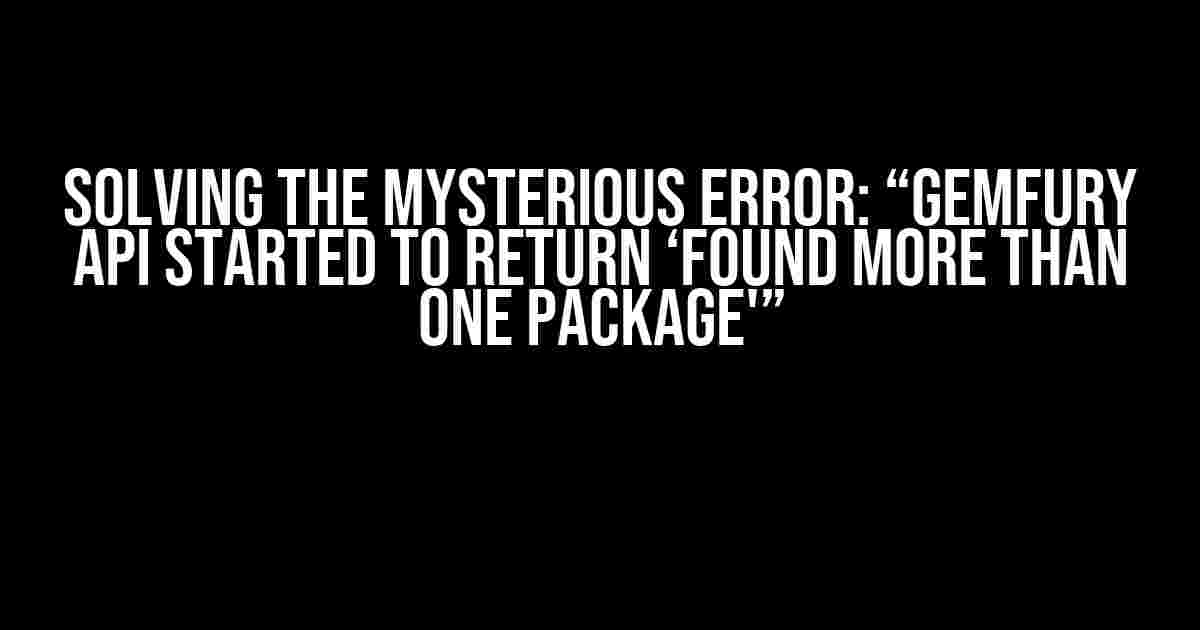What’s causing the chaos?
- Multiple packages with the same name: If you have multiple packages with the same name but different versions, the API might get confused and throw this error.
- Package naming conventions: Gemfury uses a specific naming convention to identify packages. If your package names don’t follow this convention, the API might return this error.
- API misconfiguration: Improperly configured API credentials or incorrect API endpoint URLs can also cause this error.
Detecting the root cause
- Check your package names: Review your package names to ensure they follow Gemfury’s naming convention and are unique.
- Verify API credentials: Double-check your API credentials, including your username, password, and API key, to ensure they’re correct and properly configured.
- Inspect API requests: Use tools like Postman or cURL to inspect the API requests and responses to identify any anomalies or errors.
- Review API documentation: Consult Gemfury’s API documentation to ensure you’re using the correct API endpoints and parameters.
Solutions to the “Found more than one package” error
Solution 1: Unique package names
Original package name: my-awesome-package
Unique package name: my-awesome-package-v1.2
Solution 2: API configuration tweaks
- Re-check API credentials: Verify your API credentials, including your username, password, and API key, to ensure they’re correct and properly configured.
- Adjust API endpoint URLs: Double-check the API endpoint URLs to ensure they’re correctly formatted and pointing to the right resources.
Solution 3: Using package IDs
API request: GET /packages/{package_id}
Best practices for avoiding the “Found more than one package” error
| Best Practice | Description |
|---|---|
| Unique package names | Ensure package names are unique and follow Gemfury’s naming convention. |
| API configuration | Verify API credentials and endpoint URLs to ensure they’re correct and properly configured. |
| Package IDs | Use package IDs instead of package names to identify packages. |
| API documentation | Regularly review Gemfury’s API documentation to ensure you’re using the latest and correct API endpoints and parameters. |
Conclusion
Happy coding, and may the API be with you!
Here are 5 Questions and Answers about “Gemfury API started to return ‘Found more than one package'”:
Frequently Asked Questions
Get answers to the most frequently asked questions about Gemfury API returning “Found more than one package” error.
What does “Found more than one package” error mean?
This error occurs when the Gemfury API finds multiple packages with the same name but different versions. It’s like trying to find a specific book in a library with multiple books having the same title but different authors! The API gets confused and can’t determine which package to return.
Why did I start getting this error suddenly?
You might have recently uploaded a new version of your package with the same name as an existing one, causing the conflict. Alternatively, someone else might have uploaded a package with the same name, leading to the error.
How can I fix the “Found more than one package” error?
Easy peasy! You can fix this by specifying the exact version of the package you want to retrieve. Use the `version` parameter in your API request to pinpoint the correct package. If you’re unsure, you can also use the `latest` parameter to get the most recent version.
Can I use a wildcard to retrieve all packages with the same name?
Yes, you can use a wildcard character (\*) to retrieve all packages with the same name. This way, you can get a list of all packages with the same name but different versions. Just be aware that this might return a large number of results, so use it wisely!
How can I prevent this error from happening in the future?
To avoid this error, make it a habit to specify the exact version or use the `latest` parameter when requesting a package. Additionally, ensure that your package names are unique and follow a consistent naming convention to minimize the risk of conflicts.



